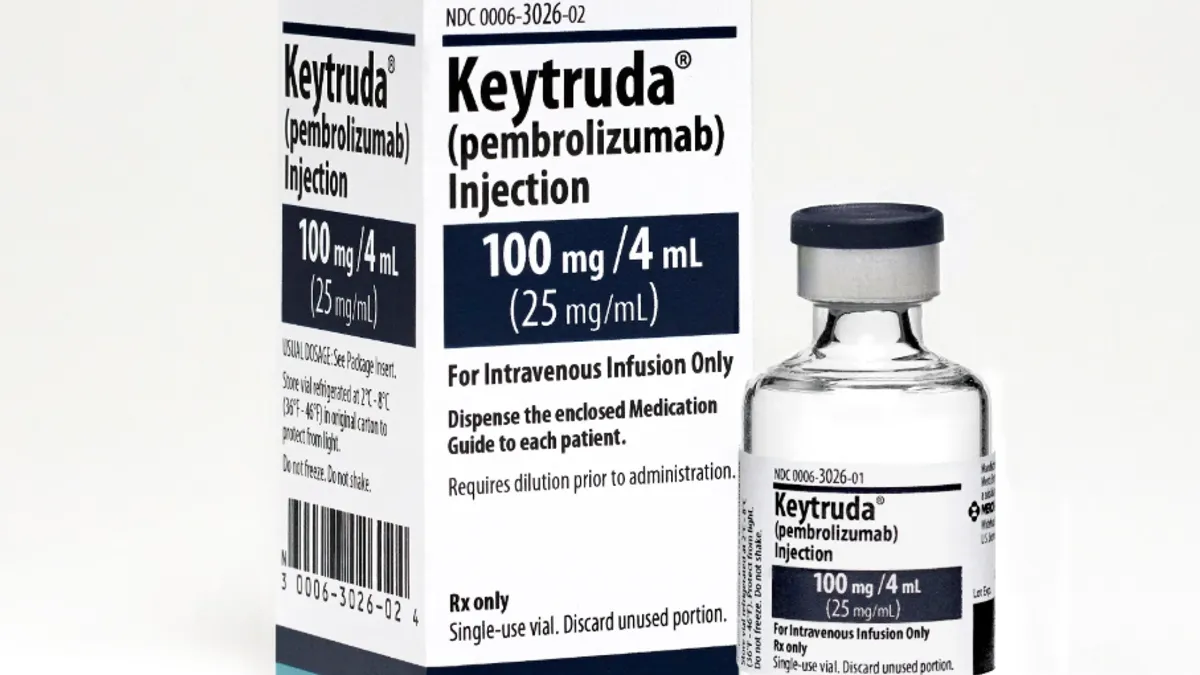As patent protection for the cancer juggernaut Keytruda approaches a critical juncture, Merck & Co. won’t give up market share without a fight. The company revealed this week that a subcutaneous version of the drug — along with chemotherapy — was as effective in a late-stage trial as the original recipe, which is infused intravenously.
The results were meaningful to Merck as it seeks to remain a leader in the next generation of cancer care and fend off potential rivals shouldering into the territory.
Keytruda has been a gamechanger in oncology with 41 indications and $25 billion in sales last year, eclipsing AbbVie’s Humira as the bestselling drug in any therapeutic area. The trouble for Merck, however, is that the massive success has become a load-bearing pillar for the company, representing more than 41% of all sales in 2023, a percentage that has grown year over year. In 2022, Keytruda’s sales were only 35% of the company’s as a whole.
Even as Merck bolsters its pipeline to make up for lost sales when direct competition enters the market in 2028, the company’s fate is firmly tied to Keytruda for the time being.
Competition heats up
Merck isn’t the only subcutaneous checkpoint inhibitor — Roche’s Genentech scored the first U.S. approval for an under-the-skin anti-PDL1 treatment with Tecentriq Hybreza in September. A modified version of Genentech’s bestselling drug Tecentriq, the new product leverages delivery technology from partner Halozyme to cut the injection time down to about seven minutes as opposed to the original intravenous infusion, which can take up to an hour.
Comparatively, Keytruda’s subcutaneous version took only two to three minutes to inject, Merck senior vice president and head of oncology global clinical development Dr. Marjorie Green said in a release. Merck’s delivery technology for subcutaneous injection comes from South Korean partner Alteogen.
The market for Tecentriq prior to the approval has been only a fraction of Keytruda’s. Roche pulled in $4.2 billion in 2023 sales of the drug, giving Merck a much broader base to work with when its own subcutaneous version enters the arena.
Tecentriq Hybreza likely won’t be the only other competition in the mix. Bristol Myers Squibb, a longtime rival of Merck’s in the checkpoint inhibitor space, is expected to hear from the FDA by the end of December about its application for a subcutaneous version of anti-PD1 Opdivo.
Sales for the original version of Opdivo, while still far short of Keytruda’s, were over $9 billion last year — more than double that of Tecentriq — adding a higher-profile contender to Merck’s subcutaneous peers.
Merck’s shares rose almost 2% this week following news of the subcutaneous data.
A leading history
Ten years after Keytruda’s original approval, the drug is still growing its market substantially. In a third-quarter earnings call last month, CFO Caroline Litchfield pointed out that sales grew 21% to $7.4 billion, driven by its wide range of indications, including for patients with non-small cell lung cancer.
And Merck has been exploring the drug’s potential in earlier lines of cancer treatment, gaining FDA approval for nine indications in earlier-stage settings, according to president of Merck Research Laboratories Dr. Dean Li during the call.
Keytruda is also a popular choice for companies looking to combine their drugs with a leading checkpoint inhibitor in clinical studies. Merck’s vice president of oncology research Dr. Gregory Lubiniecki told PharmaVoice in 2022 that Keytruda remains a strong choice as a control arm for other cancer trials because “it is such an important part of standard-of-care for many tumors.”













